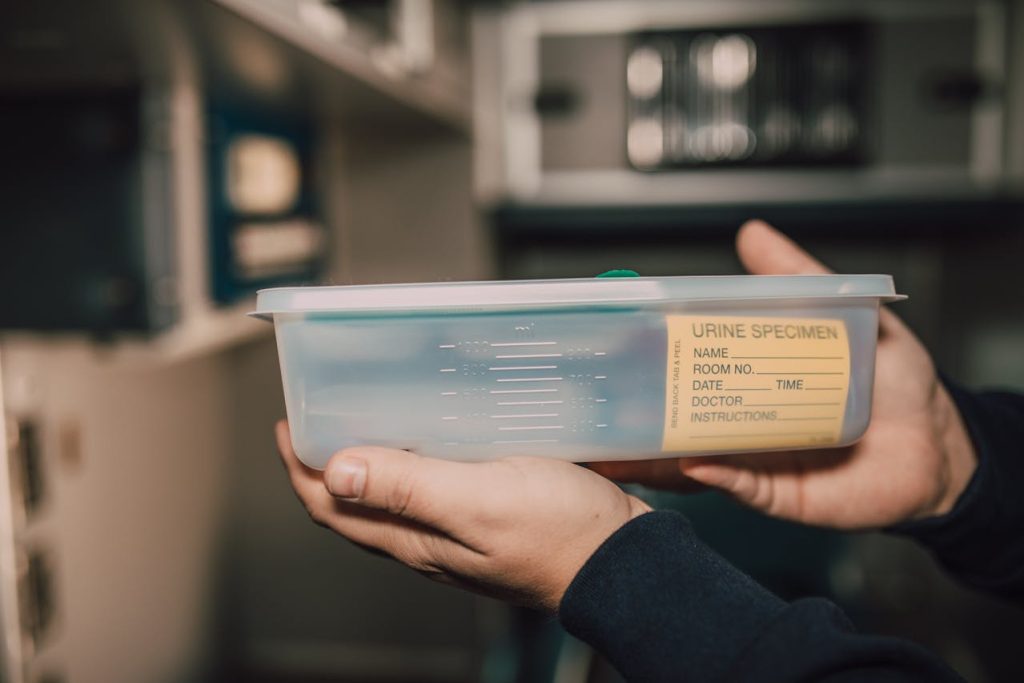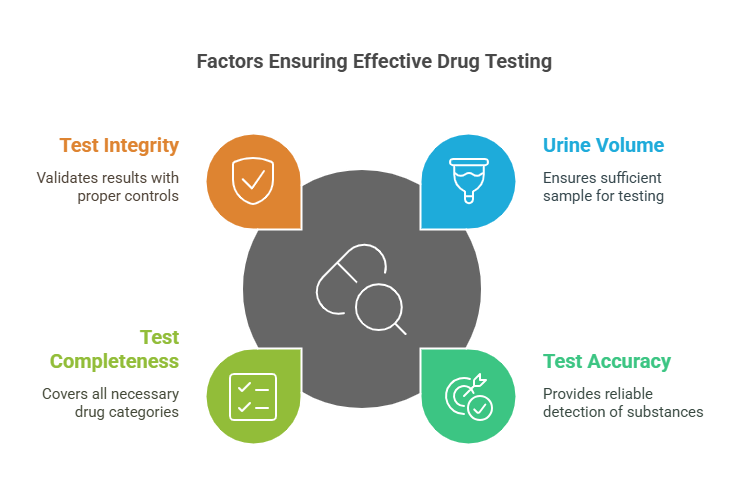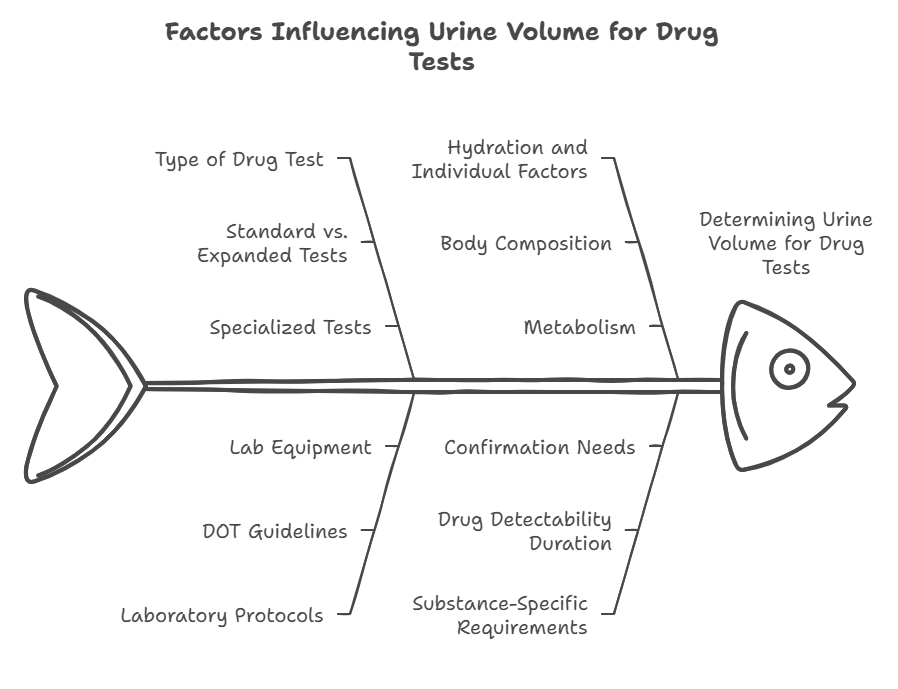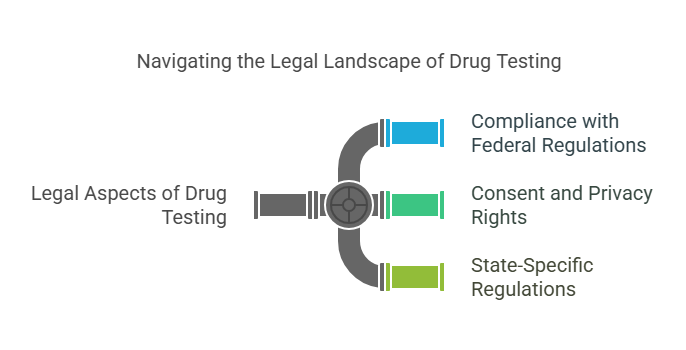How Much Urine is Typically Required for a Drug Test?

Introduction and Overview
In today’s world, drug test has become a routine practice for many employers, healthcare providers, and government agencies. Whether you’re applying for a job, undergoing a health screening, or complying with probation requirements, understanding the logistics of drug testing is crucial. One of the most common questions individuals ask when preparing for a drug test is: how much urine is needed for a drug test?
The amount of urine required for a drug test may seem like a minor detail, but it plays a significant role in the accuracy, reliability, and validity of the test. In this article, we will explore the factors influencing urine volume requirements, provide insights into the various types of urine drug tests, and explain the procedures involved.
Why Urine Amount Matters for Drug Testing

Urine is a commonly used sample for drug testing because it is a non-invasive and easily obtainable biological specimen that contains metabolites from substances consumed. The amount of urine needed for a drug test is critical because:
- Accuracy: A sufficient volume ensures the sample can be thoroughly tested for various substances. Too little urine may compromise the test’s ability to detect drugs accurately.
- Completeness: An adequate sample ensures that the testing process covers all necessary drug categories, reducing the likelihood of a partial or incomplete analysis.
- Test Integrity: The correct volume of urine allows for proper dilution ratios and the use of internal controls to validate the test results.
Typically, urine drug tests require a specific volume of urine to be collected to ensure that the sample is viable and suitable for lab testing.
Types of Urine Drug Tests
There are several types of drug tests that utilize urine samples. Each test serves a different purpose and may have unique requirements for the volume of urine needed. Here are the most common types of urine drug tests:
- Urine Drug Test for Employment: Employers often require job applicants or employees to undergo drug testing as part of the hiring process or workplace safety protocols. These tests may include a standard 5-panel or 10-panel drug test, which screens for a range of substances, including marijuana, cocaine, opioids, and amphetamines.
- Health Screening Drug Test: Individuals undergoing routine health screenings may be asked to provide a urine sample to test for substances that could affect their overall health, such as alcohol, prescription medications, or illicit drugs.
- Probation or Parole Drug Testing: Individuals on probation or parole may be required to submit urine samples for drug testing to ensure they are complying with their terms of release. These tests may be random or scheduled and are typically part of a monitoring program to track drug use.
- Court-Ordered Drug Testing: In legal situations, such as family court or criminal court, a judge may order drug testing to assess whether an individual has been using illegal substances.
While the amount of urine needed for these tests generally falls within a similar range, the specific requirements may vary depending on the test’s purpose and the substances being detected.
Factors Affecting Urine Amount and Our Services
Understanding how much urine is needed for a drug test is essential for both individuals and organizations. However, several factors influence the required volume for a urine drug test. These include the type of test being conducted, the substances being tested for, and the specific protocols followed by the testing laboratory. In this section, we will explore the variables that impact the urine sample requirements and explain how Exact Background Checks can assist both individuals and employers with drug testing and compliance.
Factors That Affect the Amount of Urine Needed for a Drug Test

Different types of drug tests and testing protocols may require varying amounts of urine. While there is a general range for most drug tests, understanding the specific needs for each situation is important.
1. Type of Drug Test
The type of drug test being conducted plays a significant role in determining how much urine is needed for the analysis. Here’s how different tests vary:
- Standard 5-Panel Drug Test: The most common drug test used in employment screenings and routine health checks. It typically requires 45 to 60 milliliters (about 1.5 to 2 ounces) of urine. This test screens for the presence of five major drug categories, including marijuana, cocaine, amphetamines, opioids, and phencyclidine (PCP).
- Expanded 10-Panel Drug Test: Used when employers or other entities want a more detailed screening to detect a broader range of substances. This test may require a similar amount of urine (45 to 60 milliliters), but it detects additional substances like barbiturates, benzodiazepines, methadone, and others.
- Specialized Drug Tests: Some drug tests focus on detecting specific substances like marijuana, cocaine, or opioids. These tests may have different requirements depending on the drug being tested for and the sensitivity needed to detect low levels of substances. For example, a marijuana-specific test may require slightly more urine to confirm recent usage.
- Probation or Court-Ordered Drug Tests: Typically, these tests require a standard urine sample (about 45 milliliters), but they may have stricter guidelines for collection and documentation. These tests are often conducted under direct supervision to prevent tampering.
While 45 to 60 milliliters is the typical volume for most tests, some tests may require more or less depending on the specific substances involved and testing procedures.
2. Laboratory or Agency Protocols
The requirements for urine volume may also vary depending on the laboratory or testing agency conducting the test. Different labs may have slightly different protocols based on the equipment used, the substances being tested for, and the legal or organizational requirements they follow. However, most reputable testing labs follow strict standards for collecting, processing, and analyzing urine samples to ensure accurate and reliable results.
For example, laboratories regulated by the Department of Transportation (DOT) for drug testing may have stricter guidelines on urine volume and sample handling. DOT guidelines require a minimum of 45 milliliters of urine for federal drug testing, which aligns with typical testing volumes.
3. Hydration and Individual Factors
Hydration and individual factors such as body composition, metabolism, and health can influence the amount of urine produced. Individuals who are well-hydrated may produce larger volumes of urine, while those who are dehydrated or have certain medical conditions may produce smaller amounts. This can occasionally affect the ability to provide an adequate sample for drug testing.
Testing labs often require that the sample meet a specific volume, and if the sample is too small (typically less than 45 milliliters), the individual may be asked to provide another sample.
4. Specific Requirements for Different Substances
Some drugs are detectable in urine for longer periods than others, and some testing methods require a larger volume of urine to detect trace amounts of certain substances. For example, marijuana (THC) can remain detectable in the urine for several days or weeks, depending on the frequency of use. Similarly, certain drugs like methamphetamine or opioids may be detectable for shorter periods but may require more urine for confirmation if traces are low.
Testing for these substances may require an increased urine sample volume to ensure detection within the required sensitivity thresholds.
Exact Background Checks: Our Drug Testing and Employment Screening Services
Exact Background Checks offers comprehensive drug testing services to assist both individuals and employers. Whether you are an employer looking to screen potential employees or an individual preparing for a drug test, we can help navigate the entire process with ease and confidence. Our services ensure that all tests are performed accurately, reliably, and in compliance with legal and industry standards.
Our drug testing services include:
- Urine Drug Testing: We offer both standard 5-panel and expanded 10-panel tests, along with specialized tests to detect a wide range of substances.
- Compliance with Legal Regulations: We ensure that all drug tests are conducted in line with federal and state regulations, including Department of Transportation (DOT) compliance for specific industries.
- Fast and Reliable Results: We provide timely and accurate results to help employers make informed decisions, ensuring peace of mind for both employees and employers.
- Customized Solutions: We offer flexible drug testing options to suit different requirements, from pre-employment screenings to random testing programs.
At Exact Background Checks, we simplify the process by providing clear instructions, ensuring compliance with the testing protocols, and maintaining confidentiality.
Summary of Urine Amounts for Various Types of Drug Tests
Here is a summary of typical urine volumes required for different types of drug tests:
| Drug Test Type | Typical Urine Volume | Substances Tested |
|---|---|---|
| Standard 5-Panel Drug Test | 45 to 60 milliliters | Marijuana, cocaine, opioids, amphetamines, PCP |
| Expanded 10-Panel Drug Test | 45 to 60 milliliters | Additional drugs such as barbiturates, benzodiazepines, methadone |
| Specialized Drug Tests (e.g., marijuana) | 45 milliliters or more | Specific substances like marijuana, cocaine, opioids |
| Probation or Court-Ordered Test | 45 to 60 milliliters | Varies based on court requirements, generally includes standard drugs |
Legal Aspects of Drug Testing and Urine Sample Collection

Drug testing, especially when involving urine samples, is subject to numerous laws and regulations. These laws are designed to ensure that drug testing is done fairly, ethically, and with respect for privacy rights. Here are some of the most important legal aspects to consider:
1. Compliance with Federal Regulations
For certain industries, such as transportation, aviation, and healthcare, drug testing is mandatory, and there are strict rules regarding the collection and handling of urine samples. The Department of Transportation (DOT), for example, has very specific requirements for drug testing in safety-sensitive positions. According to DOT regulations, the minimum amount of urine required for a drug test is 45 milliliters, and the collection process must follow stringent protocols to ensure that the sample is not tampered with.
Additionally, federal agencies such as the Substance Abuse and Mental Health Services Administration (SAMHSA) oversee guidelines for urine drug testing in federal employment.
2. Consent and Privacy Rights
In most cases, drug testing requires the consent of the individual being tested. Employers and testing agencies must inform individuals about the drug test and obtain their permission before proceeding. Refusing to provide a urine sample may result in the rejection of a job application or a violation of probation terms.
Furthermore, privacy rights are paramount. The results of drug tests are confidential and can only be shared with the appropriate parties, such as the employer or probation officer. Laws like the Health Insurance Portability and Accountability Act (HIPAA) govern the confidentiality of medical information, including drug test results.
3. State-Specific Regulations
Each state may have its own laws regarding drug testing, particularly when it comes to the workplace or employment screenings. While federal regulations set general guidelines, states can enforce stricter rules or offer additional protections for employees. For instance, some states have limitations on testing for marijuana use, particularly in states where it is legalized for medicinal or recreational use.
Employers and organizations must be aware of both federal and state laws to ensure compliance with the appropriate regulations.
Frequently Asked Questions (FAQs) About Urine Drug Testing
Here are answers to some of the most common questions regarding urine drug testing:
Why is the amount of urine important for a drug test?
The amount of urine is crucial for:
- Accuracy: A sufficient volume ensures thorough testing.
- Completeness: Adequate volume covers all necessary drug categories.
- Test Integrity: Proper volume allows for correct dilution ratios and internal controls.
What are the typical urine volumes required for different types of drug tests?
- Standard 5-Panel/Expanded 10-Panel: 45 to 60 milliliters (1.5 to 2 ounces).
- Specialized Tests: 45 milliliters or more, depending on the substance.
- Probation/Court-Ordered: 45 to 60 milliliters, varying based on court requirements.
What factors influence the amount of urine needed for a drug test?
Factors include:
- Type of Drug Test: Standard vs. expanded panels, specialized tests.
- Laboratory/Agency Protocols: Different labs may have varying requirements.
- Hydration and Individual Factors: Body composition, metabolism, health.
- Specific Requirements for Different Substances: Some drugs require more urine for detection.
What legal aspects are important to consider during urine drug testing?
Important legal aspects include:
- Compliance with Federal Regulations: DOT and SAMHSA guidelines.
- Consent and Privacy Rights: Obtaining consent and protecting confidentiality.
- State-Specific Regulations: Varying state laws on drug testing.
What happens if an individual cannot provide the required amount of urine?
If the sample is too small (typically less than 45 milliliters), the individual may be asked to provide another sample. Testing labs often require a specific volume to ensure accurate results
Why is the amount of urine important for a drug test?
The amount of urine is crucial for:
- Accuracy: A sufficient volume ensures thorough testing.
- Completeness: Adequate volume covers all necessary drug categories.
- Test Integrity: Proper volume allows for correct dilution ratios and internal controls.
What are the typical urine volumes required for different types of drug tests?
- Standard 5-Panel/Expanded 10-Panel: 45 to 60 milliliters (1.5 to 2 ounces).
- Specialized Tests: 45 milliliters or more, depending on the substance.
- Probation/Court-Ordered: 45 to 60 milliliters, varying based on court requirements.
What factors influence the amount of urine needed for a drug test?
Factors include:
- Type of Drug Test: Standard vs. expanded panels, specialized tests.
- Laboratory/Agency Protocols: Different labs may have varying requirements.
- Hydration and Individual Factors: Body composition, metabolism, health.
- Specific Requirements for Different Substances: Some drugs require more urine for detection.
What legal aspects are important to consider during urine drug testing?
Important legal aspects include:
- Compliance with Federal Regulations: DOT and SAMHSA guidelines.
- Consent and Privacy Rights: Obtaining consent and protecting confidentiality.
- State-Specific Regulations: Varying state laws on drug testing.
What happens if an individual cannot provide the required amount of urine?
If the sample is too small (typically less than 45 milliliters), the individual may be asked to provide another sample. Testing labs often require a specific volume to ensure accurate results
Conclusion
In summary, understanding the amount of urine needed for a drug test is crucial for both individuals and employers. The standard urine sample size required for most drug tests typically ranges from 45 to 60 milliliters, but specific test types, substances, and testing protocols may impact these requirements. Whether you’re preparing for a drug test related to employment, health screenings, probation, or other purposes, it’s essential to know what to expect during the testing process.
By ensuring compliance with federal and state regulations, obtaining consent, and adhering to privacy protections, employers and individuals can ensure the integrity of drug testing procedures. Exact Background Checks provides reliable and compliant drug testing services that can assist employers with employment screening and help individuals navigate the testing process. Whether you need help with urine drug tests or other forms of employment screening, Exact Background Checks is here to provide professional support.
Understanding the logistics of urine drug testing, including the amount of urine required, helps everyone involved be better prepared and more informed throughout the process.



